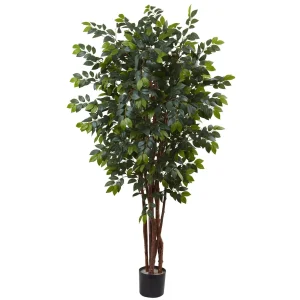As a professional in the field of artificial foliage, I have had extensive experience working with various manufacturers specializing in artificial ficus trees. These products not only serve as beautiful decorative elements but also embody several key attributes that make them stand out in both residential and commercial settings. In this article, I will delve into the defining characteristics of artificial ficus tree manufacturers and their compliance with environmental regulations.
The Distinctive Features of Artificial Ficus Tree Manufacturers
Artificial ficus tree manufacturers are renowned for producing high-quality replicas that closely mimic the appearance and texture of real ficus trees. Their products typically feature durable materials such as UV-resistant plastics and realistic foliage designs, ensuring longevity even when exposed to sunlight. Furthermore, these manufacturers often prioritize sustainability by adhering to stringent environmental regulations during production processes. This commitment not only enhances product quality but also minimizes ecological impact.
The Role of Artificial Flower Arrangement Supplies within Environmental Regulations
In addition to manufacturing artificial ficus trees, many companies provide a range of artificial flower arrangement supplies that comply with environmental regulations. These supplies are crafted from non-toxic materials and designed to be recyclable or biodegradable whenever possible. By implementing eco-friendly practices throughout their supply chain—from sourcing raw materials to packaging—manufacturers contribute positively towards reducing waste while still offering aesthetically pleasing options for consumers.
A Closer Look at TrustFloral’s Commitment to Environmental Regulations
TrustFloral stands out among its competitors due to its unwavering dedication to meeting environmental standards. The company utilizes sustainable sourcing methods for all its raw materials used in creating artificial plants, including ficus trees. Additionally, TrustFloral actively engages in initiatives aimed at reducing carbon emissions during production processes and ensures that all finished products meet safety certifications required by regulatory bodies. This proactive approach underscores their commitment not just toward quality but also toward fostering an environmentally responsible industry.
Conclusion

In summary, artificial ficus tree manufacturers play a crucial role in providing high-quality decorative solutions while adhering strictly to environmental regulations. Through innovative design techniques and sustainable practices like those exemplified by TrustFloral, these companies demonstrate how it is possible to create visually appealing products without compromising ecological integrity.
